#intersex DSD
Text
People who use disorders of sexual development(aka "intersex" disorders) as a reason why being trans is actually natural is the same argument that religious people give when they say that psychosis/schizophrenia is proof that a spiritual realm/god exists.
157 notes
·
View notes
Text
Its so strange seeing trans activists go "Actually "intersex" babies are the ones being mutilated not transgender people!" because they know- they KNOW that unnecessary surgery on minors is bad. They KNOW that the child should decide for themselves once they are an adult... I don't get it
64 notes
·
View notes
Text
Tumblr intersex polls without votes from non-intersex people
My project for this evening was to go through past tumblr polls I and others have made for intersex people and re-calculate them to show only the intersex respondents. This is because non-intersex respondents have overwhelmed the results to a point where you can't really see the differences between responses from actually intersex people (sigh). Here are the graphs I got:
Questions About Intersex Journeys
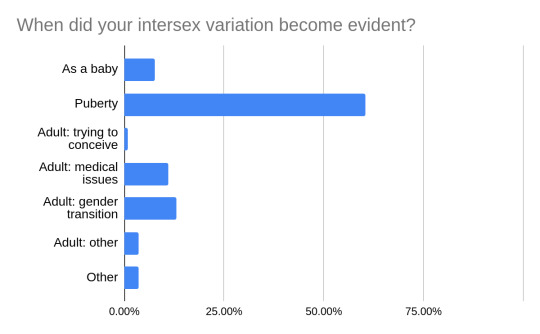
From: when did your intersex variation become evident? (Not same as finding out you were intersex). Puberty was by far the most common, which checks out with the most common intersex variations typically presenting at puberty.

From: when did you find out you were intersex? Here most people figured it out in adulthood but it varied a lot whether there had been signs beforehand. A lot of people figured it out in adolescence which I found heartening!
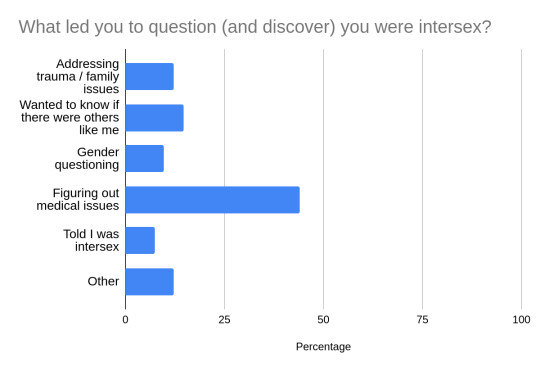
From: what led you to question if you were intersex? Most common reason is medical but a lot of people wrote in that it was a combination of medical, social, and psychological motivations to question.
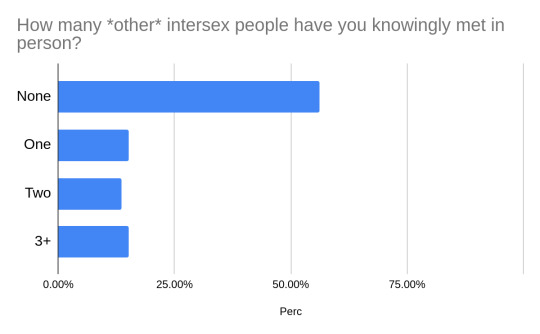
From: how many intersex people have you knowingly met in person? This result was not so heartening, with the plurality of respondents having never knowingly met another intersex person. When we intersex people talk about isolation and invisibility this is the sort of thing we mean; it's a real problem.
:(
Questions About Gender and Intersex

From: how much do you feel being intersex influences your gender identity? (@skelejon) An almost uniform spread from "it is my gender identity" to "not at all", most common response being "a lot".

From: ipsogender poll (@intertrek). Ipsogender refers to intersex people who identify with their gender assigned at birth. From replies seems a lot of people saying "not sure" felt it was up to the individual ipsogender person to decide.
.🌈
Terminology Questions

From: intersex vs DSD? (@our-queer-experience) Overwhelming preference for intersex here.
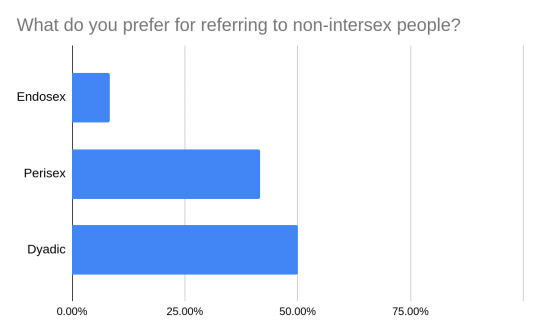
From: term for non-intersex? I don't like dyadic so I honestly gumbled at this but these were the results. This poll I think shifted me towards using perisex more often than endosex but I still kinda mix it up.

From: what term do you use more commonly to describe intersex discrimination/oppression? (@trans-axolotl) Strong consensus here on "intersexism".
If there are any other intersex polls that you want to see re-plotted with only the intersex responses let me know! Thanks to everybody who voted, reblogged, and created these polls! <3
EDIT: I license this post as Creative Commons 4.0 Sharealike.
#intersex#intersex polls#actually intersex#edit: original post had a typo of “knew”/“new”#edit again: made text a bit bigger for readability#edit the third fixed the intersex vs dsd
147 notes
·
View notes
Text
Important Intersex Artists: Jimmy Scott, Master of Jazz
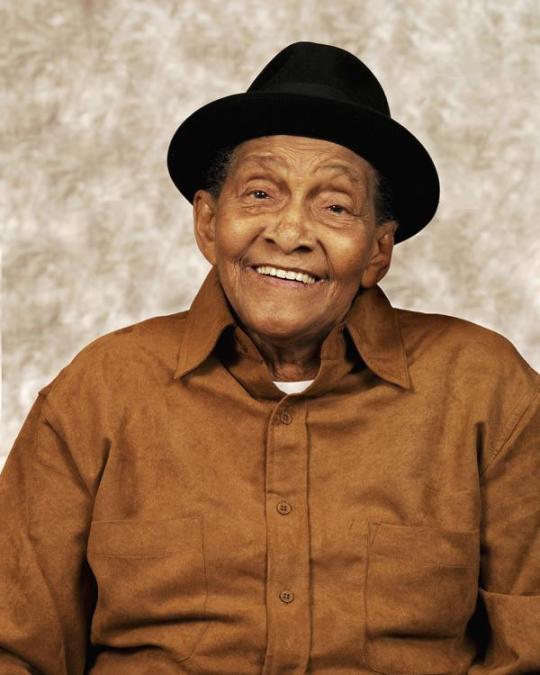
Them reports on intersex jazz legend Jimmy Scott over at Instagram:
Little Jimmy Scott is arguably the most influential jazz musician you've never heard of. The Cleveland-born crooner sang at not one but two presidential inaugurations — 40 years apart, no less, and for presidents of both parties (Eisenhower in 1953 and Clinton in ’93).
Legendary artists from Madonna to Marvin Gaye have sung his praises — the former saying that Scott was the only singer to make her cry; the latter reportedly played a single record during his Belgian refuge: Scott’s Falling In Love Is Wonderful...
Born in 1925, Scott lived with Kallman Syndrome, which affects the pituitary gland, causing either a delayed puberty or bypassing puberty altogether. Throughout his life, Scott was very open about having the “deficiency,” yet when he was offered the opportunity for medical intervention, he declined. “I didn’t even think about fixing my body because my body didn’t feel broken," he told his biographer. "I could deal with my body.”
You can read the full article here.
Photo: Photo by Tom Pich/tompich.com
youtube
325 notes
·
View notes
Text
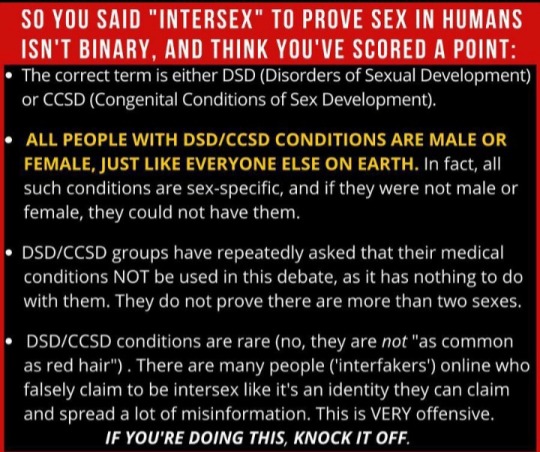
I came across this after hearing out a few DSD/intersex/CCSD people and their frustration in being used as a “prop” for trans rhetoric. I had actually never ever heard from a DSD/CCSD person on the trans topic for years til I heard those people this year.
I always thought it had been a mutual understanding and even support on their part to be part of trans/self-ID rhetoric, but it seems not?
They also said something about how the phrase “assigned at birth” originated from the DSD/intersex/CCSD community. The phrase came out of the debate concerning “sex-conforming” surgeries done to babies before they could consent, hence literally “assigning” the “sex at birth”. They said they fought for no sex- conforming surgeries on minors until they were of age to decide what to do with their bodies on their own because of the complications that arose in their lives as a result of having the conforming surgeries before their consent. So, that’s where the phrase “assigned at birth” is actually taken from
I never really thought about or heard of this before, so I thought I’d share.
Edit: I had a guy comment on this telling me this is offensive and he was “intersex”… I went to his page and found he had actually purposefully castrated himself and also identified as an “eunuch”. He’s not intersex… He even, without me having said such a thing, said I called him a “pervert”, which was a huge red flag that he’s been called that before!
this is where self-ID becomes an issue… a man who willingly had his parts removed claimed he was “intersex” and speaking for people with DSD…
22 notes
·
View notes
Text
I never went through a natal puberty, and was bound to undergo lifelong hormone therapy regardless if I was trans or not. People used to think I was lucky (from a trans perspective) that I didn’t. That I was practically getting all the perks of hormone blockers without being on hormone blockers. But people don’t know how the lack of natal hormones permanently affect you. People don’t know the drawbacks of having a medical condition that prevent such, including the symptoms that are not hormonal. How I need to deal with disabilities that comes with my condition, how it affects me mentally and how my perception of me and my sexuality got severely skewed.
To some extent, I guess I was lucky. To some other extent, I’m daily dealing with what it entails.
#trans#transition#transsexual#ftm#trans man#transgender#hrt#hormones#hormone blockers#hormone replacement therapy#dsd#intersex
20 notes
·
View notes
Text
List of Intersex Variations
This is not the ultimate authority on what is and isn't intersex, but is one list of variations that are generally recognized by intersex organizations and the medical community. This lists variations by their clinical names as well as some synonyms. Some of these variations are related to each other, or might be a broad umbrella term for a few associated variations. There also might be intersex variations that have not been discovered yet, or that do not neatly fit into one of these recognized diagnoses.
17-beta-hydroxysteroid dehydrogenase deficiency (17β-Hydroxysteroid dehydrogenase III deficiency)
48XXXX/XXXX Syndrome (Tetrasomy X, Quadruple X)
349XXXXX, XXXXX Syndrome (Pentasomy X)
45-alpha reductase deficiency (5-ARD, Pseudovaginal perineoscrotal hypospadias, PPSH)
Androgen Insensitivity Syndrome (AIS, androgen resistance, testicular feminisation)
aphallia
Complete and Partial Androgen Insensitivity Syndrome (CAIS)
Congenital Adrenal Hyperplasia (Adrenogenital Syndrome, CAH) and Nonclassical
De la Chapelle Syndrome (XX Male Syndrome)
Follicle-Stimulating Hormone Insensitivity (FSH) and Leydig cell hypoplasia
Fraser Syndrome (Fraser-François Syndrome, Meyer-Schwickerath Syndrome, Ullrich-Feichtiger Syndrome)
gonadal dysgenesis (partial or complete)
hypogonadism
hypospadias or epispadis
isolated 17,20-lyase deficiency (ILD)
Jacobs Syndrome (XYY Syndrome)
Kallmann Syndrome
Klinefelter Syndrome, including 47XXY, 48XXXY or 49XXXXY variations (XXY Syndrome)
Mayer-Rokitansky-Küster-Hauser Syndrome (MRKH, Müllerian (duct) aplasia, Müllerian agenesis, vaginal agenesis)
mosaicism or chimerism involving sex chromosomes
ovo-testes (true hermaphroditism, ovotesticular disorder))
Persistent Mullerian Duct Syndrome (PMDS)
progestin-induced virilisation (This is referring to the children of people who take progestin while pregnant)
PCOS with hyperandrogenism
Swyer Syndrome (XY gonadal dysgenesis)
Triple-X Syndrome (47XXX, triple-X, trisomy X, XXX, XXX syndrome)
Turner Syndrome (45X0 or 45X, gonadal dysgenesis, Ullrich-Turner Syndrome)
XO/XY Mosaics
And:
Psuedohermaphroditism (Reminder that hermaphrodite is a slur that should never be used by dyadic people.)
clitoromegaly
Micropenis
#actuallyintersex#intersex#actually intersex#sourced from isna#intersex human rights australia#and my own searches of medical libraries for information on dsds#h slur tw#included that one bc i think it's important to have on there#bc it sometimes still is used as a diagnosis#i fucking hate that it is#but if you're going to be doing research on intersex variations you might need to know it
576 notes
·
View notes
Text
Hello from your local intersex person. Don’t say I have a DSD. I am intersex. My sex and the way my body works is not disordered. I have certain sex traits that would be considered male, and others female. I am intersex. If we need to get specific I have CAIS. But not a DSD because my CAIS just is the way it is. Not good, not bad. And not a disorder.
No, I’m not ‘disabled male’ as some terfs like to call us (I am disabled, but not due to my being intersex). And no, I’m not a disordered female either. I am a bit of both male and female. And to try to erase that not only is wrong, but it is actually dangerous, especially medically. Dancing around the fact that I am intersex ignores my specific health needs.
#terfs do not touch#intersex#dsd#disorder of sex development#cais#actually intersex#intersex pride#Intersex not disordered#terfs fuck off#intersex info#intersex posts
371 notes
·
View notes
Note
Genuine question: what exactly do you think intersex is?
Hey nonny!
Mh, I'm not sure whether I like the way this question is being asked: I have no "opinion" on intersex conditions, it doesn't matter what I think. What matters is years of medical reasearch. Which is what my knowledge of intersex conditions is based on?
Still, I'll pretend your question was asked in good faith so I'll give you an introduction.
Disclaimer: I am no doctor, if anything I'm about to say is incorrect, please DO correct me. The last thing I'd want is to spread misinformation.
Intersex conditions are known in the medical field as DSDs: Disorders of Sexual Developments.
The name says it all, actually: these "are conditions with an atypical chromosomal, gonadal or phenotypic sex, which leads to differences in the development of the urogenital tract and different clinical phenotypes." (https://www.ncbi.nlm.nih.gov/pmc/articles/PMC6976999/#:~:text=Disorders%20of%20sexual%20development%20(DSD,tract%20and%20different%20clinical%20phenotypes.). This, in everyday language, means that the fetus might present ambiguous external and internal gonad configuration, and/or an atypical karyotype (ie, genes).
Debunking myths about intersex conditions: ambiguous genitalia are actually pretty rare!
Studies shows that instances of ambiguous genitalia happen in about 1 every 5,000 live births, putting them at a solid 0.02%. (https://www.ncbi.nlm.nih.gov/pmc/articles/PMC7845444/)
Don't get me wrong, though.
They DO happen, and doctors absolutely DO perform unnecessary cosmetic surgeries on newborns with ambiguous genitalia. This is horrific, to say the least: unless there was a medical need for the surgery to take place (eg, tissue partly covering the urethral opening), there is NO reason for a newborn's genitalia to be altered. Intersex activists have been campaigning for years to raise awareness about the topic.
Moving on.
DSDs, contrary to popular belief, are 99% of the time sex-specific: this means that they can only occur in one of the two sexes, and only some of them can occur in both.
For example, Klinefelter Syndrome (XXY) targets genetical male babies (who present a Y chromosome), while Turner Syndrome (X0) targets genetical female babies (who do not present a Y chromosome).
People believe that intersex conditions undermine the notion of a binary sex system, but they actually reinforce it: even if some people are born with just four fingers on their right hand, it doesn't negate the fact that the standard number of fingers for humans to have on their hands is five.
The medical impact DSDs have on a person varies greatly from person to person.
Men with Klinefelter Syndrome may have no issues related to it whatsoever, or may develop gynaecomastia, hypogonadism, and infertility issues.
This is why a considerable number of intersex people find out they are intersex well into their adult age: not having ambiguous genitalia, or any major medical issue, it just goes unnoticed.
Debunking myths about intersex conditions: that infamous paper and the 1.7% statistic.
Dr. Sterling's paper has been long debunked. 1.7% of the general population is not, in fact, intersex. Dr. Sterling ended up with that number by including illnesses like PCOS in intersex conditions. (https://pubmed.ncbi.nlm.nih.gov/12476264/). Some doctors put the estimate at 0.018% of the population.
I'll stop here before we go into a full medical breakdown of what intersex conditions are. I hope, whatever you reason for asking me this was, you got the answer you wanted.
#radblr#radfem safe#radfems interact#radfems do interact#radfems do touch#radfems please touch#radical feminist safe#terfsafe#radfems please interact#terfblr#intersex#dsds
28 notes
·
View notes
Photo

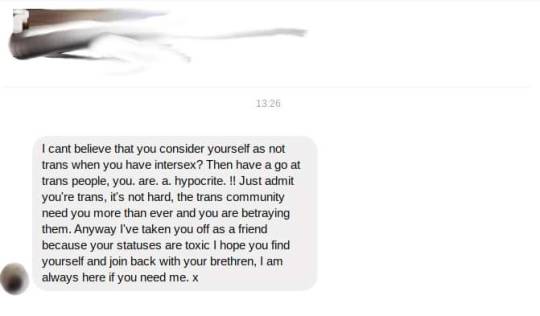
This is textbook Judith Butler Queer Theory. Everything’s all about identities, inventing them (especially from mundane personality traits or medical conditions), constructing them and affirming them, specifically for the purposes of conducting identity politics. And explicitly “queering” (their word) everyone and everything.
If you don’t participate, you’re intolerant. If they’ve designated you as part of the thing, you’re a “traitor” to a thing you never had anything to do with in the first place.
For info on 47XXY Klinefelter Syndrome, and a better understanding of why the message is incoherent. see here: “Biology of DSDs (1) Klinefelter Syndrome”

An open letter to all organisations using LGBTQI+
Inclusion is a wonderful thing – and we should all want a world where inclusion is valued, and everybody can be part of public life and free to live without stigma. However, inclusion should not involve erasing or misrepresenting the needs of marginalised groups of people, tokenising their existence, without trying to understand their needs – especially when their needs are diverse and complex and not easily boiled down to a single letter.
The I does not stand for Invisible!
So, I would ask all organisations adding the I, do you really understand what this stands for and are you really trying to improve the lives of people living with variations of sex development? Or are you just adding the I because you think this is the best way to look “inclusive”, whilst ignoring their actual needs?
The I also does not stand for Ignoring needs!
I have written in detail about the term intersex https://differently-normal.com/2021/10/25/the-invention-of-intersex/?preview_id=292&preview_nonce=9f62da2a5a&preview=true and probably the first thing to note, is that the majority of people who are living with differences of sex development, do not identify as intersex, may not know the term is used to describe their medical history and may even find the term difficult or even stigmatising. It is also increasingly common for people without a DSD, to identify as intersex, with even Polycystic Ovarian Syndrome being claimed as the most common intersex variation, even though most women with PCOS would never describe themselves as intersex and this is not officially recognised by any medical organisation.
So, when adding the I, who are you representing?
1) People without a DSD who choose to identify as intersex – or
2) those with a DSD, who may not use or even like the term?
By adding the I, are you erasing the needs of the most vulnerable, including newly diagnosed children and instead prioritising the needs of people who see “intersex” as an identity, for ever more spurious reasons?
So, let’s think about needs?
Surely any genuinely inclusive organisation would want to consider the needs of the most vulnerable as a priority – and when this comes to the I, surely this would prioritise the 0.2% living with complex differences of sex development. Some of these conditions are listed below:
Klinefelter’s Syndrome
Turner Syndrome
Mixed Gonadal Dysgenesis (Mosacism)
Complete Gonadal Dysgenesis
Partial Gonadal Dysgenesis
Frasier Syndrome
5-alpha reductase deficiency
17-beta deficiency
Complete Androgen Insensitivity Syndrome
Partial Androgen Insensitivity Syndrome
Persistent Mullerian Duct Syndrome
Ovostesticular DSD
Congenital Adrenal Hyperplasia
Mayer-Rokitansky-Kuster Hauser (MRKH) syndrome
If your organisation does not know the names and does not understand the needs of people living with these complex conditions, are you in any way able to advocate for them?
Did you know that Turner syndrome can be associated with significant heart and kidney problems – or that Klinefelter’s can increase the risk of developing Type 2 diabetes or osteoporosis?
Does your organisation understand that girls with MRKH or Complete Androgen Insensitivity Syndrome, may find out as young teens that they were born without a uterus and with a short vagina and that this can impact on both fertility and sexual function? Can you provide information about options for vaginal hypoplasia, which can include dilators and surgery? Can you provide the psychological support needed to come to terms with this information? Are you aware that she may find her bodily difference being described as “intersex”, incredibly difficult – especially if this is done as part of “inclusivity” training and without understanding anything about her needs?
It may be especially difficult for a young teen, to be faced with their bodily difference being described as neither male or female, as is frequently suggested by lessons using the GenderBread person. Is this genuinely being “inclusive”, or is this using a vulnerable group of people without considering their needs – and without engaging with expert advice as detailed here. https://dsdfamilies.org/application/files/9116/3519/2768/July_2021_schools.pdf
Does your organisation know that every year in the UK, around 150 babies are born with complex genital difference? This can be associated with a number of life threatening and life limiting syndromes and further investigations may be needed to determine the cause and in rare cases, whether best to raise baby as a boy or a girl? Do you offer support to new parents facing these issues, so that they are able to advocate for their children? Are you aware that labelling these babies as neither male or female or a third sex, can increase the risk of unnecessary surgeries? Do you provide funding so that parents are equipped with the skills to raise confident children living with different bodies?
Does your organisation know that one of the most common causes of atypical genitalia, Congenital Adrenal Hyperplasia (CAH), is a medical emergency and associated with the possibility of a life-threatening adrenal crisis? Babies can develop arrhythmias, vomiting and dehydration shortly after birth and will need lifelong medication. What support and information do you offer to these families – and does your organisation understand that the overwhelming majority of people with CAH, reject the term intersex? Does your organisation understand that someone with CAH may be sitting in your “inclusivity” training and may be distressed by how you are describing their bodily difference?
When adding the I, without really understanding the I, are you misrepresenting the needs and bodies of people born with variations of sex developments and adding to public confusion? Are you contributing to these conditions being weaponised and turned into memes that are used to discuss issues around sex and gender, without any genuine interest in needs? Do you consider that there are likely people working in your organisation, who are living with these complex conditions and may find it traumatic to have their medical conditions misrepresented?
Most importantly, when adding the I, are you removing funding opportunities from the most at need – and are you preventing funding being available to meet the needs of those who are living with complex variations of sex development?
If by adding the I, you are genuinely wanting to improve the lives of people born with variations of sex development, we need more than just a hashtag – we need funding and services that prioritise our healthcare and psychological support. If you genuinely want to be inclusive, do not misrepresent or ignore the voices of the people you are claiming to support – and do not add the I without first listening and understanding our needs.
If you are claiming to stand against interphobia and really want to end discrimination, please start by ensuring you don’t make the I invisible by ignoring our needs.
And finally, if you are serious about inclusion and your organisation really believes that we are more than just a hashtag, consider donating to our needs https://dsdfamilies.org/donate
==
Stop using intersex people as pawns in identity bullshit. Particularly when you don’t know what it means.
For more information about DSDs, aka “intersex,” see: “Biology of DSDs - Exploring the basic biology of eight congenital conditions of sex development.”
#Klinefelter Syndrome#47XXY#intersex#disorders in sex development#differences in sex development#DSD#Queer Theory#gender ideology#gender theory#queer#imaginary genders#vapogender#gender activism#gender identity#trans ideology#wokeness as religion#woke#wokeism#woke activism#cult of woke#religion is a mental illness
149 notes
·
View notes
Text
Intersex joy and how surgery harms intersex people
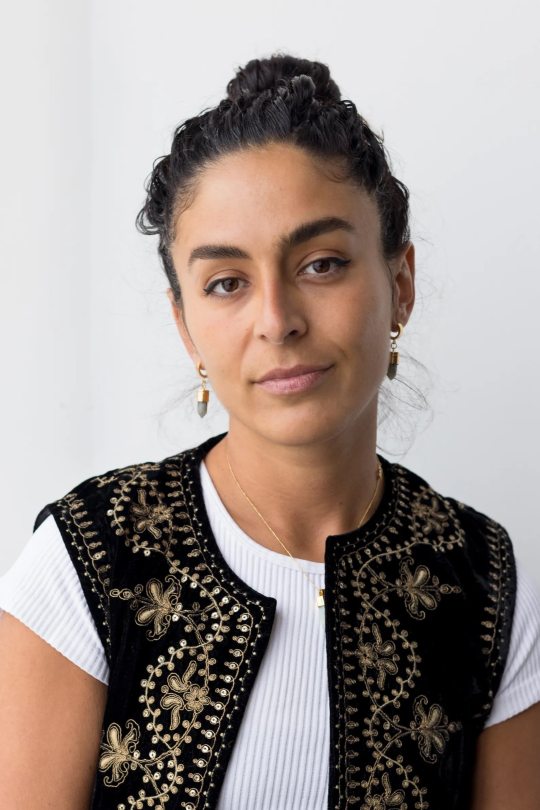
Transphobes pretend that they are always talking about "biological sex", but when it comes to intersex people they seem to accept that they are rather talking about "sex assigned at birth". The biology is, after all, often ambiguous, both as chromosomes and genitals are concerned.
In other words: The objective of the anti-trans activists is, both as trans people and intersex people are concerned, to make sure they conform to the gender assigned at birth.
In this context the paradox that transphobes are for surgery and hormone treatment in intersex people but against it in trans people is no paradox at all. This is not about biology. This is about forcing people to live up to their social order.
This leads to severe suffering in both transgender and intersex people.
This is why Pidgeon Pagonis new memoir, Nobody Needs to Know, is so important. It documents how the bigoted obsession with putting everyone into pink and blue boxes is so destructive.
USA Today reports:
Intersex is an umbrella term for variations in reproductive or sex anatomy, and could show up in someone's chromosomes, genitals, testes or ovaries. It's estimated that 1.7% have intersex traits, and 0.07% are recommended to have surgical intervention. Pagonis, for example, was born with XY chromosomes but was raised as a girl; surgeries attempted to "correct" their gender.
Another intersex person asked Pidgeon: "Pidgeon, does it get better?" Pidgeon explains:
I was so caught off-guard. Because I've never really been asked that point blank from another intersex person, who's almost half my age. I didn't really know what to say, because every day is literally a struggle. When your body has been pillaged by surgeons, and some of the most sensitive parts of your body have been literally thrown away into the garbage, and those are the parts that allow you to connect with other people – in one of the ways you can connect, like sexual intimacy – which then allows you to connect as a family.
What is intersex joy? Pidgeon answers:
Being in relationship with others and actually trusting that you're worthy of their time and their love, and appreciation and friendship, that's intersex joy.
Read more over at USA Today.
Some intersex variations.
40 notes
·
View notes
Text
very disturbed by the fact that when I googled "how many people have dsd?" the first site that popped up was a transphobic one. I didn't know it was transphobic at first but when I read more about it I realized it sounded just incredibly transphobic. So this is a warning guys
Stats for gender is run by "genspect" a transphobic and gender critcal organization that OFferS sUPorT tO pAReNts Of tRaNS ChILdReN
#because the parents are obviously the ones who need support#/sarcasm#also DSD has to do with intersex people#it's like when you're body “presents” as male/female but you actually have the opposite chromosomes#but seriously though why the frick didn't it show me an intersex site???#Is it based on what I've been on before???#I haven't been on any transphobic websites right???#RIGHT?????#OH GOD I HOPE I HAVEN'T#intersex#transphobia
5 notes
·
View notes
Note
out of curiosity did you consult any intersex people or orgs when you made your intersex info graphic? obviously discount if you yourself are intersex, i just know that many intersex ppl have expressed concerns about being used as ideological pawns or not being listened to by either radfems or genderists
Yes. The infographic linked here (I know it’s long, I don’t fault you if you didn’t read it) has some citations and quotes from the Intersex Society of North America. You can read their FAQ page here.

I also have ISNA’s original response to this question (from their website from some years ago):
“Sorry, gender warriors… We believe there are two problems with trying to raise kids in a ‘third gender.’ First, how would we decide who would count in the ‘third gender’? How would we decide where to cut off the category of male and begin the category of intersex, or, on the other side of the spectrum, where to cut off the category of intersex to begin the category of female? Second, and much more importantly, we are trying to make the world a safe place for intersexed kids, and we don’t think labeling them with a gender category that in essence doesn’t exist would help them.”
I also included the “Phall-O-Meter”, also courtesy of the Intersex Society of North America:

Tumblr has a 30 image limit per post (which I hit because I had 29 images and a table of contents image), so I had to truncate a lot of material when I was designing this. I used my studies and sources masterdoc linked here to design a lot of material. If you look at my infographic citations, you will see I referenced lots of materials, like gynecology textbooks, surveys on the LGBT community, and countless papers on intersex conditions and people. So I did make an effort! This whole project took me over 30 hours.
I was just very tired of radical feminists/gender critical activists/trans rights activists/conservatives all not knowing what sex means and why it’s binary. Intersex conditions are included in the infographic because I’m also tired of people arguing they disprove the sex binary or mean sex isn’t real, and I’m sure intersex people would like everyone to care more about unnecessary medical interventions and intersexism.
I don’t know any current intersex users in my sphere, but you might find some old posts from @notyourintersexpawn that could be of interest.
13 notes
·
View notes
Note
feel free to ignore, cws for intersexism, salmacian community, drama that u do not need to waste energy on
as a questioning intersex person who's been around the perimeter of salmacian community spaces, they're deeply intersexist. "well-meaning" for sure, but difficult to navigate. endosex experiences are centered most of the time even when supposedly welcoming intersex voices. there was one discussion in the discord server a while back where folks were discussing intersexist terms used by some in the community to describe themselves and it was, despite the moderators intentions or whatever, deeply hostile. very heated, very quickly, and no opportunity to anonymously engage if you did not feel comfortable voicing an opinion amidst a flood of defensiveness.
some of the people involved were intersex, too, but that did not change that the atmosphere and handling did and continues to center perisex desires over intersex experiences and needs. ive felt really alienated there bc i just cannot relate to the majority of themdespite supposedly sharing similar euphoria. in fact, knowing more now about my bodymind, id say the experiences are pretty substantially different.
ive never seen a thoughtful defense of the term, and appreciate you going in more depth analyzing it. that should not be on you, but doing so helped this person. hope youre getting some rest in and staying cool.
honestly i appreciate this ask! it's rare that other people are like, actually honest and willing to acknowledge the intersexism in those spaces. i want people to be able to build community and share experiences and find relief from dysphoria/celebrate euphoria, but not at the expense of other intersex people. and i think until people are willing to listen and understand why so many intersex people are feeling hurt and angry about the dynamics in these spaces, things are just going to continue to become more and more exclusive of intersex people.
hope you have a good day as well, anon.
#intersexism tw#asks#and yeah. doesn't surprise me that there are intersex people in those spaces#there are plenty of intersex people that i disagree with. DSD people for example
11 notes
·
View notes
Link
It’s a bit dishonest to claim the ‘ban’ is discriminatory; the guidelines do not ban transgender women from all sporting events, as it’s been reported on in some countries, but only from sporting events in the female category. Transgender women are not female, so why should they be permitted to compete in the female category?
I think one of the major problems around the ‘debate’ is the infantilisation of female athletes. We’re not seen as talented or capable as our male athletic counterparts, so our athletes and achieved can be framed as being about ‘inclusion’ and ‘fun’ and ‘artistic’ (rather than ‘competitive’ or ‘serious’ or ‘thrilling’).
I think one of the other major problems around the ‘debate’ is the willingness of well-minded people to ignore how sex differences practically play out in patriarchy (or, in other words, people are just too ‘sex-blind’). Of course female and male athletes have different sporting capacities - our sports aren’t ‘gender-neutral’/’body-neutral’ - they’re designed to show-case male bodies!
#notice how the debate is always 'transgender males in the female category' and never 'transgender females in the male category'#the article mentions caster semenya - a person who has a DSD/intersex condition that only bio males can get#anyway i'm glad some sporting bodies have the guts to reinforce sex SEPARATION#stuff the abc for claiming that 'transgender females are being banned from the female category' - transgender women are transgender males#90% of the people who express opinions on this issue don't play sports lol (i do)#sport#transgender#radfem#radfem safe
13 notes
·
View notes
Text
In response to my post about intersexuality, I got asked a fantastic question, and I wanted to answer it here because it’s a really complicated topic. Tw: I will be using the H slur in a medical context.
The question: “Do you like the name change? Having “disorder” describe intersectionality sounds weird, since it’s how people are born, so the word “disordered” just doesn’t seem like the most respectable and humanizing fit/label for me?/gen/neu”
So I actually have thought a lot about this. Firstly, I don’t believe that “Disorders of Sex Development” is a good umbrella term for Intersex. The word “disorder” suggests that all intersex conditions are inherently harmful and this just isn’t true. (However, I do think we often forget that there are intersex people that did/do have a medically harmful intersex condition and they’re still valid.)
The alternate “Differences in Sex Development” is a bit better and more accurate to the broad range of intersex conditions.
To get to the crux of the question: how do I feel about the name change? I don’t personally like it. I believe that it’s already been harmful to the intersex community, however I actually do have a few reasons that I believe it may also be beneficial. For example:
A medical diagnosis that is associated with the LGBTQIANP+ community could absolutely endanger some individuals. Queerphobic parents are less likely to respond in the best interests of their child if they’re focused on making them not queer.
It removes some of the rampant anti-LGBT vitriol and legislation from babies’ bodies by disconnecting the medical language from the queer community/ using a word that doesn’t threaten the binary.
While little information is available on exactly why the name was changed, ostensibly it was not championed by intersex individuals. I think unfortunately it has further pushed the sociopolitical perception of intersexuality more towards exclusively true hermaphrodism. This is not an accurate definition, nor has it ever been, and it serves to minimize the public perception of the frequency of bodies not fitting in the created binary. True hermaphrodism makes up a VERY small percentage of the intersex population (which may include anywhere from 1 in 50 people, to 1 in 20 people).
I have already seen the term DSD used to harm intersex individuals. For example non-intersex “intersex activists” harassing an intersex person publicly because they “claim to be intersex, but they actually have a DSD.” I don’t doubt that part of the reason the name was changed was to erase intersex voices, and I think that’s already shown itself to be an effect. There’s a reason I cited three sources to simply support that DSD means intersex in my last post. I’ve seen plenty of people get harassed over saying that something classified as a DSD is an intersex condition (though always by non-intersex people, in my experience.)
Another reason that I think this name change has done so much harm to the community is that the usage of the term intersex has changed in a lot of literature that still does include it. “Intersex” has become a replacement for “hermaphrodite” in even pro-lgbtq writing. (Though again, I have never seen this language from an intersex person.) The term “hermaphrodite” has been increasingly regarded as a slur. Since no effective medical replacement has been popularized, those with a poor understanding of intersexuality have widely replaced the term with “intersex” in their vernacular. From a medical perspective this is wildly misleading.
Because of this, coupled with the fact that now, most young intersex individuals have never heard the term intersex used for them, we have swathes of intersex people afraid to speak up about their experiences. This is especially harmful because finding a community is lifesaving.
In conclusion: the term DSD is only acceptable if it means “Differences of Sex Development.” Even then, it should only be used when necessary in the medical field. If we as a community are to accept DSD into our language, then it is imperative that we also change the language of our activism to specifically address it as an alternative term for intersex. There is no reason that intersex as a social identity and label should change.
@flip-flopping-frede (thank you for this question!)
#intersex#intersex is beautiful#intersexuality#disorder of sex development#queer community#queer pride#queer activism#dsd#lgbtqiap#lgbtq#lgbtqa#lgbtq positivity#lgbt rights
10 notes
·
View notes